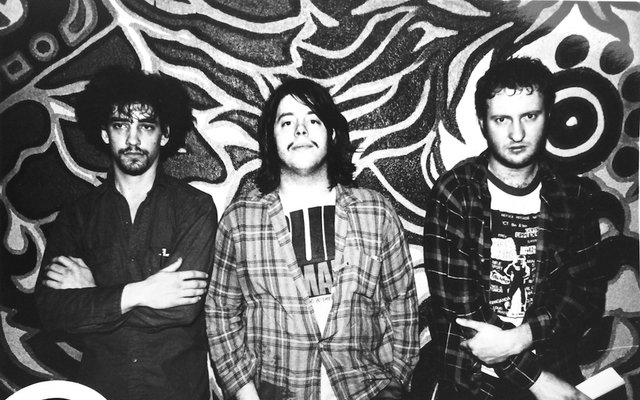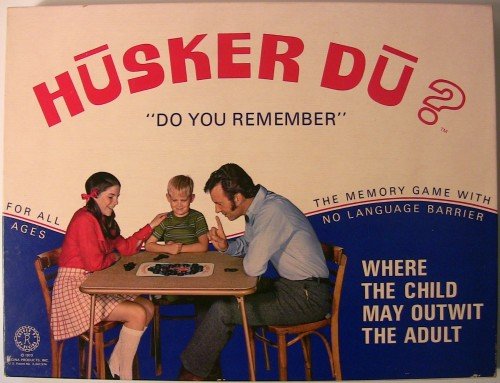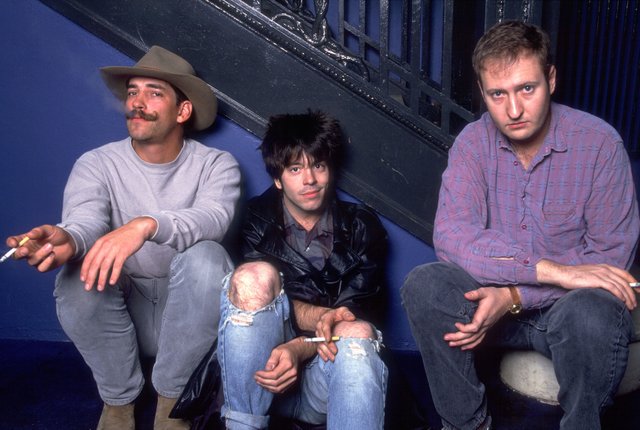Do you remember Hüsker Dü?

The recent passing of Grant Hart is frustratingly sad and worthy of great mourning from a personal and artistic perspective. Whether on his own, or as a dog-eared corner of the Hüsker Dü holy triangle with Greg Norton and Bob Mould, Hart remains a crucial part of the American post-punk iconography.
Hüsker Dü started out in the late ‘70s in the fertile music scene in Minneapolis as a punk / hard-core group and when they broke up in 1988 they were much closer to what we call an indie rock today.
The name of the band in Danish or Norwegian means "do you remember," which was the name of the popular 1970s memory board game Hūsker Dū? . Why exactly that name? When bassist Greg Norton, guitarist and singer Bob Mold, and drummer and singer Grant Hart formed the band, they often played the song "Psycho Killer" by Talking Heads. As in the refrain of the song there is a part in the French "qu'est-ce que c'est", the band was tormented with a French pronouncement. Instead of that, they played the only non-phrase phrase they had rightly pronounced, and that was the name of the game.

''Husker Du, depending on whom you ask, were either the progenitors of “post-hardcore”, the founders of “emo-core”, the first of the “college bands”, or just a kick ass punk band. Or all of the above.
Their transition from “the world’s fastest band” to “America’s best rock group” was effected in a little more than a two year span, in which they released three of the greatest albums of the modern rock era (Zen Arcade, New Day Rising, and Flip Your Wig). Then, almost as mercurially, they were gone, after a quick dalliance with the “Major Label” Warner Bros.''

Formed in Minneapolis in 1978, Hüsker Dü expertly fused the velocity of punk rock with the melody of purest pop, and a powerful streak of angst that would differentiate them from all the other thrash-punk acts touring the states during the Reagan years. As a forthcoming long-awaited box set, Savage Young Dü, proves, even in their earliest days the group’s competing singers, Mould (guitars) and Hart (drums), possessed stronger songwriting chops than their angry adolescent contemporaries; their debut album, a 1981 live set aptly titled Land Speed Record, proved they could thrash faster and harder than anyone.
"There was no working class punks at all, and when we first came on the scene people thought that we were like Hell's Angels or something because we defied their definition. I don't want to overuse the word 'posers', but there was no working class punk until Husker Du came along."- Grant Hart
But it was when Hüsker Dü slowed their velocity and allowed their pop sensibility to come to the surface that their genius shone brightest.
Metal Circus came out in October 1983, and though often seen as an EP, due to the fact that there are just seven songs and it runs less than 20 minutes, it’s still considered part of their album discography. Grant Hart wrote just two of the songs on the record, and they’re quite different than anything the band had attempted previously. At the time, it was Hart’s harrowing ballad, “Diane,” that got Metal Circus the most attention, but it’s his other number on the album that proved to be the game changer. (1)

Initially, what must have been most striking to Hüsker Dü fans listening to “It’s Not Funny Anymore” in 1983 was the tempo. This was definitely not a hardcore song. There’s also more of a focus on melody—with Hart actually singing some of the words—and hooks, like the super cool harmonics Mould plays during the chorus. The lyrics are more advanced, too, with a meta quality that seems to be addressing the new approach the band is taking with the tune.
In his book, Hüsker Dü: The Story of the Noise-Pop Pioneers Who Launched Modern Rock, author Andrew Earles writes:
“It’s Not Funny Anymore” is Hüsker Dü running into the loving arms of hook-filled noise-pop. The song is a thinly veiled proclamation: “Like it or not, we are going to do this pop thing.”
When Hüsker Dü made Metal Circus, no other act was releasing music like this. Aside from the Beatles’ single version of “Revolution” and some of the early Velvet Underground material, the very idea of a lyrical pop/rock song with a thick layer of guitar distortion was essentially unheard of. Hüsker Dü continued in this direction until the very end, producing noise pop gems like “Books About UFOs” and “Makes No Sense At All” along the way.It’s hard to imagine how modern rock would’ve evolved without Hüsker Dü. To name just a couple of bands influenced by them: the Pixies, who famously put an ad in their local paper looking for a bass player who liked both Peter, Paul and Mary and Hüsker Dü (Kim Deal was the only respondent); and Nirvana, whose melodic punk rock sounds very similar to the Hüskers. Krist Novoselic once remarked that Nirvana’s style was “nothing new; Hüsker Dü did it before us.” (1)
A competition crept in between Hart and Mould, who, as the guitarist, was the more visible member of the group. Their next three albums for SST, Zen Arcade, New Day Rising, and Flip Your Wig, were released in a mere two-year span
Hart’s voice and songwriting had taken on a range and emotional authority that equaled Mould’s. Norton, the quietly neutral member of the group, called them “the punk Lennon and McCartney. Grant was the McCartney, the pop love songs, and Bob was the dark side, Lennon.”
The rivalry between Hart and Mould eventually degenerated, worsened by drug use. While pot, speed, and LSD were early favorites, Hart eventually fell into heroin. At the same time, Hüsker Dü were peaking in popularity. They signed to Warner Bros. Records for their final two studio albums, 1986’s Candy Apple Grey and 1987’s Warehouse: Songs and Stories. The production was slicker and more nuanced, and so was the songwriting—but Mould and Hart had dispensed with the fiction of being collaborators. Both albums were essentially Mould and Hart solo records woven together.
Hart’s songs continued to shine. “Don’t Want to Know If You Are Lonely,” “Sorry Somehow,” and “She Floated Away” remain some of Hart’s most arresting tunes, portraits of anger, whimsy, and tenderness painted on a wall of Mould’s catchy, distorted guitars and Hart’s brittle beats. But in 1988, Hüsker Dü disbanded. Their final meeting took place at the kitchen table of Hart’s mom’s house, upstairs from where they had practiced a decade before. (2)
Hart and Mould had remained on bad terms for many of the years that followed the split, reuniting only once, and fleetingly, at a benefit concert for Karl Mueller of fellow Minneapolis rockers Soul Asylum in 2004, playing two Hüsker Dü songs and warning attendees not to expect any further collaborations
In a note following Grant's death, Mould wrote :
''It was the Fall of 1978. I was attending Macalester College in St. Paul, Minnesota. One block from my dormitory was a tiny store called Cheapo Records. There was a PA system set up near the front door blaring punk rock. I went inside and ended up hanging out with the only person in the shop. His name was Grant Hart.
The next nine years of my life was spent side-by-side with Grant. We made amazing music together. We (almost) always agreed on how to present our collective work to the world. When we fought about the details, it was because we both cared. The band was our life. It was an amazing decade.
We stopped working together in January 1988. We went on to solo careers, fronting our own bands, finding different ways to tell our individual stories. We stayed in contact over the next 29 years — sometimes peaceful, sometimes difficult, sometimes through go-betweens. For better or worse, that’s how it was, and occasionally that’s what it is when two people care deeply about everything they built together.
The tragic news of Grant’s passing was not unexpected to me. My deepest condolences and thoughts to Grant’s family, friends, and fans around the world.
Grant Hart was a gifted visual artist, a wonderful story teller, and a frighteningly talented musician. Everyone touched by his spirit will always remember.
Godspeed, Grant. I miss you. Be with the angels.''
(1) dangerous minds, GRANT HART AND HÜSKER DÜ INVENT NOISE POP, 1983
(2) The Atlantic, Remembering Hüsker Dü's Grant Hart
Better than the Ramones......
good post.
thanks for sharing.
I give one vote and share your post due to the posing posts.
Great post
obožavam taj bend :(